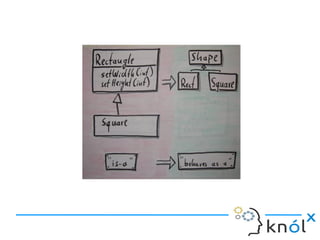Solid scala
- 1. S.O.L.I.D with Scala Oct 23' 2012 > Vikas Hazrati > [email protected] > @vhazrati
- 2. what? Five basic principles of object-oriented programming and design. When applied together intend to make it more likely that a programmer will create a system that is easy to maintain and extend over time.
- 3. problems rigid – difficult to add new features fragile – unable to identify the impact of the change immobile – no reusability viscous – going with the flow of bad practices already being present in the code.
- 4. solutions loosely coupled – shouldn’t be too much of dependency between the modules, even if there is a dependency it should be via the interfaces and should be minimal. cohesive code- The code has to be very specific in its operations. context independent code- so that it can be reused. DRY – Don't repeat yourself – Avoid copy-paste of code. Change in the code would have to be made in all the places where its been copied.
- 6. single responsibility principle - srp a module should have only one reason to change Avoid side effects Minimize code Increase re-usability touch-points Separate out different responsibilities into different code units
- 7. package com.knolx trait UserService { def changeEmail } class SettingUpdateService extends UserService { def changeEmail ={ checkAccess match { case Some(x) => // do something case None => //do something else } } def checkAccess:Option[Any] = None }
- 8. class task{ def downloadFile = {} def parseFile = {} def persistData = {} }
- 9. for scala srp applies to functions data structures packages/ modules of functions
- 10. open closed principle - ocp A module should be open for extension but closed for modification Avoid side effects Minimize code touch-points
- 11. case class Check(id:Int, bankName:String, amount:Double) class CheckProcessor { val checkList:List[Check] = List(new Check(1, "BoA", 200.0)) def checkProcessor = sendEmail def sendEmail = {} }
- 12. case class Check(id:Int, bankName:String, amount:Double) class CheckProcessor { val checkList:List[Check] = List(new Check(1, "BoA", 200.0), new Check(2, "Citi", 100.0)) def checkProcessor = for (check <-checkList) if (check.bankName == "BoA") sendEmail else sendFax def sendEmail = {} def sendFax = {} }
- 13. trait BankProcess{ def processCheck } class BoABank(name:String) extends BankProcess{ def processCheck = sendEmail def sendEmail = {} } class CitiBank(name:String) extends BankProcess{ def processCheck = sendFax def sendFax = {} } case class Check(id:Int, bank:BankProcess, amount:Double) class CheckProcessor { val checkList:List[Check] = List(new Check(1, new BoABank("BoA"), 200.0), new Check(2, new CitiBank("Citi"), 100.0)) def checkProcessor = for (check <-checkList) check.bank.processCheck }
- 14. interface segregation principle - isp many specific interfaces are better than one general purpose interface Avoid side effects Increase re-usability
- 15. trait DoorService{ def isOpen def open def close } class Door extends DoorService{ def isOpen = {} def open = {} def close = {} }
- 16. trait DoorService{ def isOpen def open def close } trait TimerDoorService{ def closeAfterMinutes(duration:Int) } class Door extends DoorService{ def isOpen = {} def open = {} def close = {} } class TimerDoor extends DoorService with TimerDoorService{ def isOpen = {} def open = {} def close = {} def closeAfterMinutes(duration:Int) = {} }
- 17. dependency inversion principle - dip depend on abstractions, not on concretions Avoid side effects reduced effort for Increase re-usability adjusting to existing code changes
- 18. class TwitterProcessor { def processTweets = new Processor.process(List("1","2")) } class Processor { def process(list:List[String]) = {} }
- 19. trait ProcessorService { def process(list:List[String]) } class TwitterProcessor { val myProcessor:ProcessorService = new Processor def processTweets = myProcessor.process(List("1","2")) } class Processor extends ProcessorService{ def process(list:List[String]) = process(list, true) def process(list:List[String], someCheck:Boolean) = {} }
- 20. for scala becomes less relevant for Scala as we can pass higher order functions to achieve the same behavior
- 21. liskov substitution principle - lsp subclasses should be substitutable for their base classes Avoid side effects a derived class is substitutable for its base class if: 1. Its preconditions are no stronger than the base class method. 2. Its postconditions are no weaker than the base class method. Or, in other words, derived methods should expect no more and provide no less
- 22. trait DogBehavior{ def run } class RealDog extends DogBehavior{ def run = {println("run")} } class ToyDog extends DogBehavior{ val batteryPresent = true def run = { if (batteryPresent) println("run") } } object client { def runTheDog(dog:DogBehavior) = {dog.run} }
- 23. object client2 { def runTheDog(dog:DogBehavior) = {if (dog.isInstanceOf[ToyDog] ) dog.asInstanceOf[ToyDog].batteryPresent=true; dog.run} } violates ocp now







![package com.knolx
trait UserService {
def changeEmail
}
class SettingUpdateService extends UserService {
def changeEmail ={
checkAccess match {
case Some(x) => // do something
case None => //do something else
}
}
def checkAccess:Option[Any] = None
}](https://image.slidesharecdn.com/solid-scala-121030233254-phpapp01/85/Solid-scala-7-320.jpg)



![case class Check(id:Int, bankName:String,
amount:Double)
class CheckProcessor {
val checkList:List[Check] = List(new Check(1,
"BoA", 200.0))
def checkProcessor = sendEmail
def sendEmail = {}
}](https://image.slidesharecdn.com/solid-scala-121030233254-phpapp01/85/Solid-scala-11-320.jpg)
![case class Check(id:Int, bankName:String, amount:Double)
class CheckProcessor {
val checkList:List[Check] = List(new Check(1, "BoA",
200.0), new Check(2, "Citi", 100.0))
def checkProcessor = for (check <-checkList) if
(check.bankName == "BoA") sendEmail else sendFax
def sendEmail = {}
def sendFax = {}
}](https://image.slidesharecdn.com/solid-scala-121030233254-phpapp01/85/Solid-scala-12-320.jpg)
![trait BankProcess{
def processCheck
}
class BoABank(name:String) extends BankProcess{
def processCheck = sendEmail
def sendEmail = {}
}
class CitiBank(name:String) extends BankProcess{
def processCheck = sendFax
def sendFax = {}
}
case class Check(id:Int, bank:BankProcess, amount:Double)
class CheckProcessor {
val checkList:List[Check] = List(new Check(1, new
BoABank("BoA"), 200.0), new Check(2, new CitiBank("Citi"),
100.0))
def checkProcessor = for (check <-checkList)
check.bank.processCheck
}](https://image.slidesharecdn.com/solid-scala-121030233254-phpapp01/85/Solid-scala-13-320.jpg)




![class TwitterProcessor {
def processTweets = new Processor.process(List("1","2"))
}
class Processor {
def process(list:List[String]) = {}
}](https://image.slidesharecdn.com/solid-scala-121030233254-phpapp01/85/Solid-scala-18-320.jpg)
![trait ProcessorService {
def process(list:List[String])
}
class TwitterProcessor {
val myProcessor:ProcessorService = new Processor
def processTweets = myProcessor.process(List("1","2"))
}
class Processor extends ProcessorService{
def process(list:List[String]) = process(list, true)
def process(list:List[String], someCheck:Boolean) = {}
}](https://image.slidesharecdn.com/solid-scala-121030233254-phpapp01/85/Solid-scala-19-320.jpg)



![object client2 {
def runTheDog(dog:DogBehavior) = {if (dog.isInstanceOf[ToyDog] )
dog.asInstanceOf[ToyDog].batteryPresent=true; dog.run}
}
violates
ocp
now](https://image.slidesharecdn.com/solid-scala-121030233254-phpapp01/85/Solid-scala-23-320.jpg)


